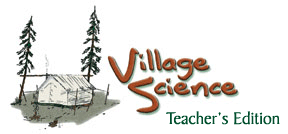|
Teacher
Edition Contents
Skill,
Tools, & Craftsmanship
Cutting
& Drying Fish
Sharpening
Nails,
Pegs, & Lashings
Falling
Trees &
Small-Scale
Logging
Guns
Chainsaw
Clutch & Chain
Ice
Pick
Shelters
Wood
Stoves
Wall
Tents
Steambaths
Insulation
& Vapor Barriers
Gas
Lamps & Gas Stoves
Travel
Piloting
A Boat
Boat
Design
Magnetos
& Spark Plugs
Carburetors
Compression
Outboard
Motor Lower Unit
Outboard
Motor Cooling System
Dogsleds
Snowmachine
Tracks
Snowmachine
Clutch
Snowshoes
Winter
Trails
|
Activities
- Remove the clutch guard from a machine and identify the parts.
- Block the back of the machine up or suspend it so the track
is free from the ground. With students at a safe distance, start
the engine. Accelerate and decelerate the engine. Can you see
the clutch responding automatically to the throttle changes?
Make sure no one is in front of the machine, and no one has
loose clothing of any kind.
- Watch the drive clutch. Is it bigger at low or high rpm?
It is bigger at low rpms.
- Watch the driven clutch. Is it bigger at low or high rpm?
It is lower at high rpms.
- Is clutch movement smooth or erratic? If it is not smooth,
what does this indicate?
If it isn’t smooth, it indicates poor lubrication.
- At below zero temperatures, put polar grease between your fingers
on one hand and regular grease between the fingers of the other
hand. Can you feel the difference?
- What would slip if the track were frozen down and the engine
accelerated? Do you see evidence of this around the clutch?
The belt burns. Fine pieces of belt are all around the clutch.
- Remove and replace a drive belt. Compare a worn and a new belt
for width. Find the price of a new belt.
- Can you see the weights in the drive clutch? If this isn’t
possible, try to find an old one that has been taken apart. Describe
how inertia causes the drive clutch to close together. Draw what
you imagine happening.
- Compress the spring from both the drive and driven pulleys.
Are they stronger or weaker than you thought? Is there a way to
tighten the spring on the driven pulley on the machine you are
looking at?
The spring on the driven pulley should be much stronger than
the one on the drive pulley. Most driven clutches have a way to
tighten or loosen the spring.
- Improvise some pulleys, even if you have to use a rubber band
as a drive belt. Use different size thread spools as pulleys if
you can’t find anything else. Predict how many turns the
driven spool will turn when the drive spool turns once.
- Drive a four-wheel ATV, accelerating through the gears. While
doing this, try to imagine what would be happening to the drive
and driven pulleys if it had a snowmachine clutch. (Actually,
Polaris six-wheelers have a clutch like a snowmachine.)
- Do you think this kind of clutch would work on an outboard motor,
giving better performance?
I have always wondered this. It might help, but it would be
heavy and bulky.
Student Response
- How do each of the following attempt to balance the engine speed
with the load?
• Trucks, cars & four-wheel ATVs:
Transmission
• Outboard motors:
Changing props
• Airplanes:
Variable speed props
- What are the three main parts of a snowmachine clutch?
Drive clutch, belt, and driven clutch
- Which clutch is on the end of the engine’s driveshaft?
Drive clutch
- Draw a picture of a big pulley driving a smaller one. If the
big pulley turns once, will the little one turn more or less than
one turn?
More than one turn
- Draw a picture of a smaller pulley driving a bigger one.
- Draw a picture of two pulleys of the same size.
- Which of the above pictures illustrates an engine starting
to move?
Smaller driving the larger
- Which one of the above illustrates an engine at cruise speed?
Same size pulleys
- What is the main advantage of a snowmachine clutch over a truck
transmission?
It is constantly sensitive to the load.
- Why couldn’t a snowmachine clutch be used on a truck or
car?
A belt cannot drive the power required to move a car.
- What is the advantage of a snowmachine clutch over a chainsaw
clutch?
A chainsaw clutch is like a one-speed transmission.
- What is the governor on an engine? What happens if there isn’t
enough load on an engine? What happens if there is too much load
on an engine?
The load is the governor. If there isn’t enough load,
the rpm are too high and the machine is stressed by the inertia
of the piston. If there is too much load on the engine, it is
again stressed, but this time from the pressure on the parts.
- What two things does the snowmachine clutch balance?
Centrifugal force in the drive clutch and the spring pressure
on the driven clutch
- Why is good lubrication important in a snowmachine clutch?
So the centrifugal force and pressure of the spring can be
in balance and friction between parts will not interfere with
that balance
Math
- A pulley 3” in diameter turns a pulley 2” in diameter.
If the first one turns 50 complete revolutions, how many revolutions
does the second one turn?
75 revolutions
|
